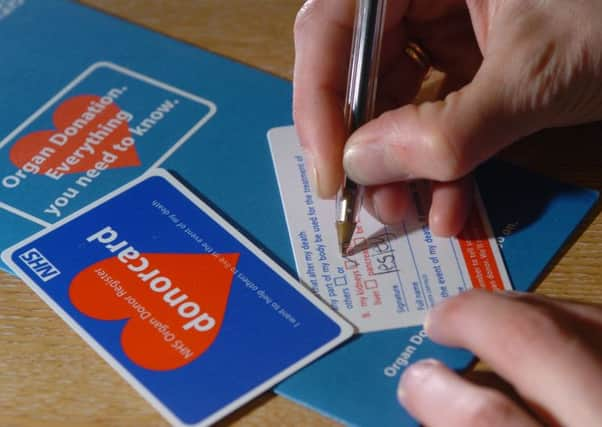Lyndsay Buckland: Should we presume organ donation consent?


The anguish suffered by those on the waiting list for an organ, which often means the difference between life and death, is unimaginable to most people.
So the fact that the number of donors whose organs have been donated after their death has doubled in six years means that fewer people are enduring this difficult time for long periods.
Advertisement
Hide AdAdvertisement
Hide AdYet it also remains the case that patients still die while waiting for an organ – last year that figure stood at 38.
So with 600 Scots waiting for an organ, is there more that could be done to increases donation even further?
The new figures, released by the Scottish Government this week, have reopened the debate about whether a system of presumed consent – whereby we are all considered potential donors unless we opt out – is the way forward.
Wales certainly thinks so. It has already passed legislation meaning that presumed consent will be in place by the end of next year following a campaign to educate the public about the changes and explaining how they can opt out.
Those who support presumed consent say it is the sensible way forward, given that support for organ donation is high, but when it comes to it many do not sign the donor register and some families do not consent to having a loved one’s organs taken.
But Scots, along with people in other parts of the UK, have so far preferred to look at other ways of increasing donor rates. They will watch with interest the experience in Wales to see if it does indeed lead to more donors and more transplants.
But could this delay prove deadly, and should we be acting rather than waiting?
It is true that donor and transplant rates appear to have been increasing, even in the absence of presumed consent.
Advertisement
Hide AdAdvertisement
Hide AdIn part, this is probably due to awareness campaigns which often use real patients who have benefited from donation to get their point across.
Such stories are always moving. There are few people as grateful as those who owe their lives to another and a family who often have to make the decision on donation in the midst of tragic circumstances.
Is it possible presumed consent makes this gift less meaningful, and if so does it matter so long as fewer people die waiting for an organ?
There are no easy answers, but hope remains that donors will continue to increase. And it is worth remembering that you are more likely to need a donated organ than to end up being a donor.